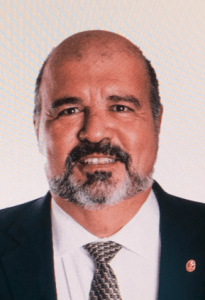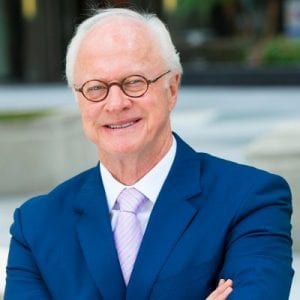Political Opposites Unite to Teach Students Value of Common Vision
Today’s students are engaging in a world of politics that’s less meaningful conversation and more “angry team sports,” observes longtime Central Florida pundit Tico Perez ’83.

Tico Perez
Perez, an attorney and staunch Republican, recently did his part to reverse that trend by joining up with former Florida Representative and Democratic champion Dick Batchelor ‘71 to talk politics with students in the School of Politics, Security, and International Affairs.
In separate post-event interviews, both Batchelor and Perez said they were impressed and encouraged by the students’ insightful questions and energy. It’s vital that students become engaged and active in politics today because “the mantle is headed to them,” Batchelor said.
“It’s up to them what the country looks like,” Batchelor said. “You can pick up the baton and create successes worthy of applause, or you can wait until there’s nothing left to applaud.”
Politics and the democratic process are personal for Perez, whose family fled both the Spanish civil war and Cuban communism. His credentials include a post on the Florida Board of Governors, a run for Congress in 2000, political talk shows and an eight-year term as national commissioner of the Boy Scouts of America.
Speaking for the left, Batchelor’s resume includes service in Vietnam with the U.S. Marine Corps; eight years in the Florida House (he was elected at age 26); international appointments by President Bill Clinton; and a grassroots campaign for a referendum that raised $2 billion for Orange County Public Schools.
Both have a long view of how politics has morphed over the years from differences of opinion to the more personal and bitter politics students see today. Batchelor points to the intensely partisan disagreements between President Ronald Reagan and House Speaker Tip O’ Neill. Both had strong opinions on how to run the country, but at the end of the day they found common ground.

Dick Batchelor
Perez contrasts that to the modern day “battle zone” of politics.
“It staggers me how quickly anyone can be called a racist or a crazy socialist liberal,” he said. “Those are horrible terms that should be reserved for horrible people. But those labels are just thrown out all the time.”
Both Perez and Batchelor point to rampant misinformation for the confusion and hate. Perez also includes the 24-hour news cycle. Editorial news shows filled with people yelling at each other gives the impression that is the appropriate way to talk, but it’s more akin to professional wrestling, he said.
“It’s entertainment. It’s not the news,” he said.
Social media is also responsible for increased partisanship, but Batchelor prefers to focus on the positives of instant information and digital platforms. Organizing a movement around a cause is exponentially easier than the old days of phone calls and handbills; it’s also casting more light on issues that need addressing.
“Right now it’s easier to be influential than at any other point in history,” Batchelor said.
Perez told students the common ground that will tame bitterness is already there.
“I think we all love this country and we want things to be better. We’re just going to get there differently,” he said.
